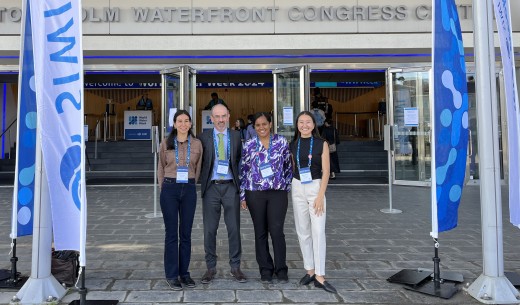Highlights of RWSN's projects, partnerships and knowledge products
RWSN at the World Water Week, 25-29 August 2024 Our activities during the World Water Week in Stockholm
 RWSN
© RWSN • RWSN
RWSN
© RWSN • RWSN
Project starts: 2024
Project finished: 2024
Summary
World Water Week presented a great opportunity to gather the RWSN Secretariat together and join our friends and partners in numerous sessions and events. You can find recordings of sessions on the WWWeek Digital Platform: https://event.trippus.net/Home/Index/AEAKgINwoafUOTY0oW53dgzJNGXw8gNEd8UeZ8jQ_rxTt9LQIqFfJLPhC1jNXurmHv6UpVWCE5N5/AEAKgIMgfLVpyqEio5bKw5tn4lZGBhnyOHByeFn-cWE-dXwGWp8fJzGZA-f84F-tWrfx9ApVi10L/eng
Enhancing Rural Water through People-Centred Data and Inclusive Cooperation (Official Online Session, ID 11793):
The session delves into rural Multiple Use water Services (MUS), evaluating the role of people-centred data in shaping water safety plans and safeguarding water sources. The session emphasizes community management with indigenous perspectives, underlining the significance of inclusive cooperation in enhancing rural water management and resilience.
Coordinating Rural Water Investments to Promote Security and Stability (Official Onsite and Online Session, ID 11653):
Water development is vital for social and economic advancement. It also alleviates conflicts that contribute to social instability. Progress requires oversight, coordination, and monitoring. However, limited collaboration among development partners can result in inefficiencies. By blending case studies with interactive dialogue, this session will explore strategies for effective donor coordination.
Stronger Together! Water Women Evening Mingle and Networking (Offsite in-person and online event):
Join us for a women-only meet and mingle event. Enjoy food and drinks while connecting with incredible women from around the world who share your passion for tackling water and sanitation challenges. This is a great chance to expand your network of fellow water women.
Stop the Flow of Lead in New Drinking Water Systems (Official Online Session, ID 11895):
This workshop will discuss sources of lead contamination in drinking water and discuss steps governments, development partners, and the private sector can take to reduce lead exposure from drinking water in low- and middle-income countries – including the strengthening of regulations and enforcement of standards for lead-free drinking water components.
 Google Übersetzer
Google Übersetzer
